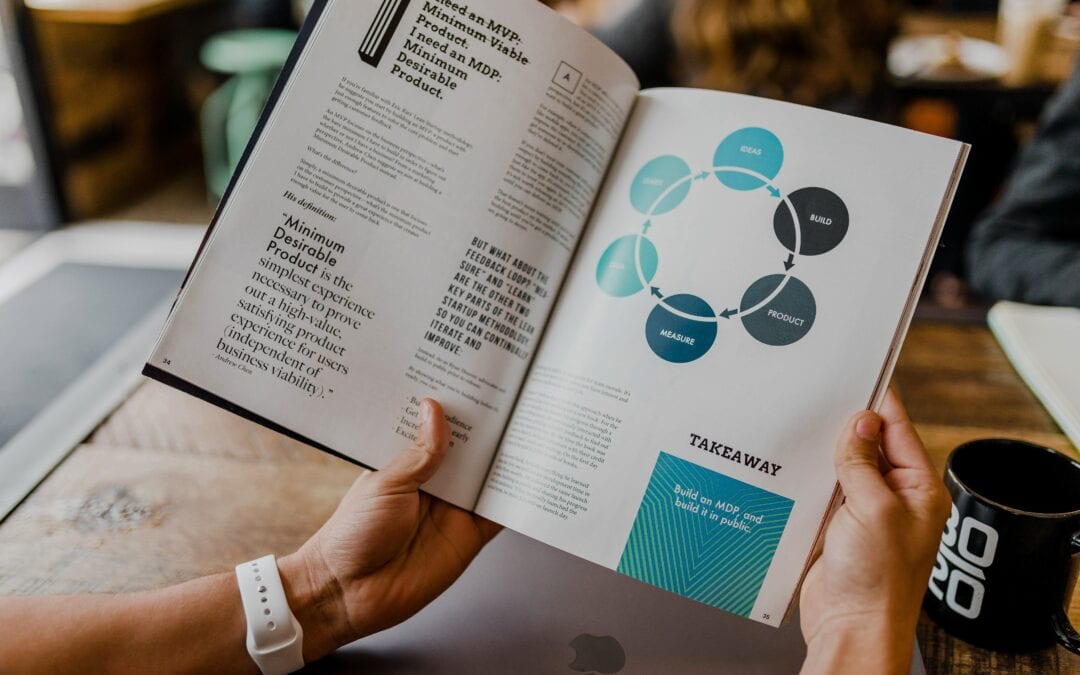Digital nomads need to invest in professional development – period.
Digital technology is one of the fastest changing industries and staying on top of the latest digital developments is the minimum that a digital nomad needs to do.
To be a desirable innovator in high demand, digital nomads also need to be horizon scanning to spot what the next big opportunity is likely to be.
Looking to build and grow your client base? Professional development is also about networking, developing new contacts, and making a name for yourself in your chosen field.
If you have worked for a big company before, you probably didn’t have to think too hard about professional development. They tend to have annual budgets to send you on training programs and to big conferences.
But when you work for yourself as a digital nomad, and the money needs to come out of your own pocket, deciding how to invest in your professional development, and justifying the expense, can be more difficult.
That’s why we are going to look at the best approaches to nurturing your continuing professional development as a digital nomad. We will touch on everything from how to budget for it, to how to identify the skills that you need and potential opportunities to continue to grow.

Your Professional Development Budget
Let’s be clear. Most big companies don’t just have professional development programs out of the goodness of their hearts, or even because they think it will result in a better workforce (though of course it will). In most countries, the money that companies spend on professional development is tax deductible. Professional development budgets are designed to benefit the company’s bottom line.
But this is also true when you work for yourself. Depending on where you are liable to pay your taxes, all or most of your professional development expenses, including membership fees of professional organizations, should be tax deductible.
Professional development should be a line in your budget. Exactly how much you should spend will depend on how much room you have to play with, and where you are on your professional road map. It is worth taking the time to layout the things that you would like to do in the coming financial period in terms of your professional development, and then see how much of that you can justify including in your budget.
But smart budgeting means that the professional development line in your spreadsheet could also bring you some tax benefits, especially if you are hovering at the line between two different tax brackets.
You can learn more about your tax liability as a digital nomad here.
As well as including professional development as a line in your financial budget, you should also include it as a line in your time keeping budget. Whatever you choose to do, it is going to take time, and just like all important tasks, you should block that time out.
While exactly how much time you need to spend might grow or shrink depending on if you are completing a course or working on a conference presentation, you should include some time in your time budget each week to focus on the basics such as reading relevant materials and researching opportunities.

Maintain Awareness
When you are a digital nomad, it can be easy to drop into your own world of travel, exploration, and work, and forget what exactly is happening in the rest of the world, and in your professional field.
But that is a mistake. When you work in a fast-paced digital field, even a year “off the radar” can leave you woefully behind and non-competitive when it comes to finding new work and securing new contracts.
For this reason, you should apply an information gathering strategy to keeping on top of what is happening in your field. You want to collect the most important information in a simple way that will be quick and easy to digest on a daily or weekly basis.
What might this strategy look like?
- Sign up for email digests from the important publications in your field;
- Listen to that podcast that is dedicated to horizon scanning in the area that you are interested in;
- Create a feed to alert you to new blog posts from important voices in your industry;
- Subscribe to that overwhelming professional email list for your community (but use weekly digest mode to keep email traffic to a minimum);
- Get on Twitter and follow the people you admire in your field (use tools to create sub-lists so that you can filter out the noise and just see the most important posts when you need to).
You can read more about how to use social media as a digital nomad here.

Identify Gaps in your Knowledge
Whether you are a programmer or a freelance writer, you have probably com across skills that it would have been useful to have for a project, but you lacked.
Perhaps you were hired for your programming skills to develop the coding for a sophisticated new fitness application. It would have been useful to have had advanced image and video editing skills in order to prepare the tutorial images and videos for embedding. But instead, you had to outsource that work package elsewhere.
Maybe as a freelance writer you have been offered the opportunity to take on overall management of a WordPress website. But it is proving to be more time consuming that you imagined because your WordPress knowledge is basic to intermediate. While you know how to SEO optimize text, running the SEO stats for the site and crunching the analytics are both new tasks to you.
Everybody will have come across skills that they wished they had either to complete a job with more ease, or to get a job that they really wanted.
When it comes to professional development, these are the first areas to focus on to expand your professional possibilities.
After this, it can be useful to engage in horizon scanning to identify skills that are likely to be useful to you in the future. This might include a new programming language that is set to explode in the coming years, or leadership skills if you are thinking of taking on talent and building a team.
Finally, there are also aspirational skills to consider. Perhaps you write a lot of health and wellness content for clients, and one day you would like to have your own wellness company or website. What knowledge or qualifications might help you along the path?
The first step is to map out the skills that you might want to develop and then prioritize them.
Don’t forget about soft skills!
When you are doing this mapping exercise, don’t forget about “soft skills” such as leadership, time management, negotiating skills for closing contracts, the ability to innovate, and creative problem solving.
These skills are increasingly recognized and valued, and may also be exactly what you need to sell and manage yourself while self-employed.

Find Learning Opportunities
Once you have identified the skills that you want to develop, it is all about finding opportunities to learn and gain the skills that you need.
It feels like there is almost an unlimited way that you might be able to do this.
First, there are a plethora of free or affordable online courses available for learning specific skills, such as advanced photoshop, a new programming language, or proper SEO. You can do these wherever you are in the world.
Finding the right courses will probably be a matter of searching, but here are some of the best places to start:
If you are interested in a more comprehensive course to develop skills such as leadership and entrepreneurship, there are quite a few good courses out there specifically designed for digital workers, such as Standford LEAD and the MIT Innovation Leadership Bootcamp. Often universities offer both in person and remote learning programs.
But formal learning is not the only way to pick up the skills that you need. Reading relevant materials and listening to related podcasts can also be a form of professional development. So is simply taking the time to research, learn about, and practice a certain skill. For example, our freelance writer that needs to understand web analytics might be best served by taking the time to poke around the data that they have and do some research online.
Learning through doing is one of the most effective ways to acquire a new skill. You might be able to find a personal or a volunteer opportunity to do exactly that. Interested in learning social media management and marketing? You might want to try some of the methods that you learn on your own social media accounts. Not only will you learn by doing, but you will be able to give specific examples of the impact of your approach.
Make time for side projects!
Making time for side projects can be a great way to develop your professional skills. And you also never know where they will lead. You might soon find you pet app project trending in the Google Play Store, or your personal YouTube channel gaining a following and providing a modest income.
Part of learning and growth is giving yourself time, space, and permission to experiment, try new things, and even fail, as long as you are learning something.
It is all about adopting a growth mindset.

Get Networking
One of the most important elements of professional development is growing your network. This is the best way to unlock new opportunities in the future.
While networking is a skill that needs to be nurtured in itself, the most important element when it comes to networking is having the opportunity to engage with the right people.
This is one of the attractions of big industry conferences. Not only can you hear from a variety of different people about the latest things happening within the sector, but you can spend a serious amount of time networking with potential partners and clients.
So, don’t turn your back on those big annual networking conferences just because you will now need to pay for them yourself. These things are usually well enough catered that at least you won’t have to buy any food or drinks for the week that you are there.
If you can score yourself a speaker spot, you might even get your conference position for free, and at least some funding towards your travel expenses.
Being at the podium also gives you an opportunity to raise your profile with a bigger cross section of attendees than individual networking alone. It can also make the personal networking process much easier as people have a good reason to come up to you for a chat.
But there is no need to wait for the big conferences to come around. There are plenty of online communities out there for digital professionals. They key is to actively engage in conversation and get noticed, rather than just lurk in the background.

Personal Development
But, while you should be focusing on your professional development, don’t let your personal development fall by the wayside.
While everyone should be investing in developing a good work life balance, this can be especially important for anyone who works for themselves, and for whom the line between work and pleasure can be difficult to distinguish.
When you work for yourself, the more you work, the more you make. It can be easy to disappear into that black hole of working all the hours that are possible.
Some people are good at balancing their work commitments and their personal commitments to themselves, while other people are terrible at it.
If you fall into the second category, it can be a good idea to take a structured approach to developing good personal habits. Start by identifying where you need to make changes and how you want to invest in yourself personally. Find opportunities to enable this. And budget time and resources to make it happen.
You can read more about balancing your work and social life as a digital nomad here.












